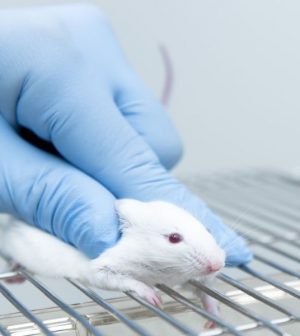- Could Your Grocery Store Meat Be Causing Recurring UTIs?
- Are You Making This Expensive Thermostat Error This Winter?
- Recognizing the Signs of Hypothyroidism
- 10 Strategies to Overcome Insomnia
- Could Artificial Sweeteners Be Aging the Brain Faster?
- Techniques for Soothing Your Nervous System
- Does the Water in Your House Smell Funny? Here’s Why
- Can a Daily Dose of Apple Cider Vinegar Actually Aid Weight Loss?
- 6 Health Beverages That Can Actually Spike Your Blood Sugar
- Treatment Options for Social Anxiety Disorder
Experimental Zika Vaccine Protects Mice Against Virus: Study

Just one dose of an experimental Zika vaccine provided mice with 100 percent protection against a potentially lethal dose of the virus, researchers report.
The quick spread of the Zika virus and its devastating effects on the brain development of babies have made the need for a vaccine to protect against this mosquito-borne virus a global issue. Currently, the main way to ward off the virus is to avoid mosquito bites.
The vaccine relies on technology previously used to create experimental vaccines for HIV and Ebola virus. It was developed by GeoVax, a company specializing in vaccines based in Atlanta. Tests of the vaccine were done at the U.S. Centers for Disease Control and Prevention in Colorado, with funding by a grant from the CDC.
The new vaccine targets a specific Zika virus protein called NS1. This protein interferes with the mosquito immune system, which allows the virus to replicate.
“A vaccine that can induce effective antibodies to NS1 and disable its function has the potential to reduce growth and transmission of Zika virus in its mosquito vector,” said Farshad Guirakhoo, chief scientific officer at GeoVax.
For the study, researchers gave otherwise healthy mice a high dose of the Zika virus. The virus was administered directly to the rodents’ brains.
“A single dose of GeoVax’s NS1 vaccine candidate protected 100 percent of vaccinated animals,” Guirakhoo said in an American Society for Microbiology release.
Mice in a control group were given a placebo vaccine. They were then given the virus. Up to 90 percent died in about one week, the researchers reported.
Although the vaccine’s performance in mice appeared promising, research in animals doesn’t always turn out as well in humans.
The study’s findings were presented last week at the annual meeting of the American Society for Microbiology, in New Orleans. Findings presented at meetings are generally viewed as preliminary until they’ve been published in a peer-reviewed journal.
More information
The U.S. Centers for Disease Control and Prevention provides more information on Zika virus.
Source: HealthDay
Copyright © 2026 HealthDay. All rights reserved.










